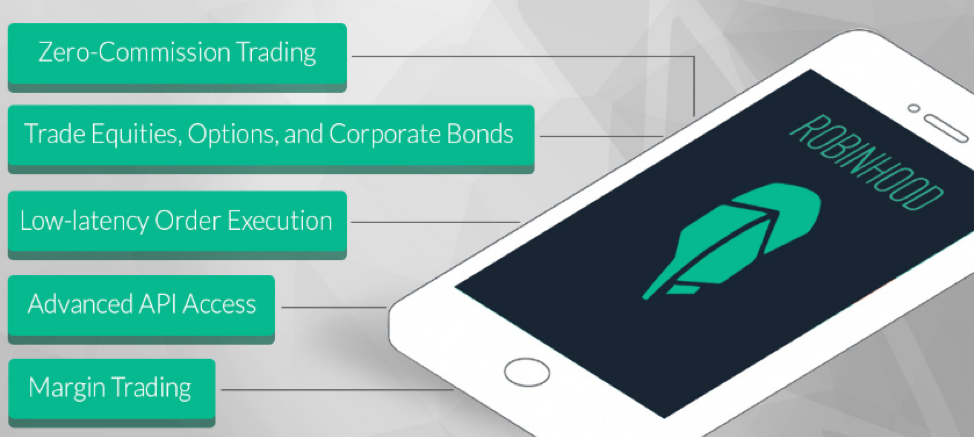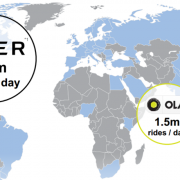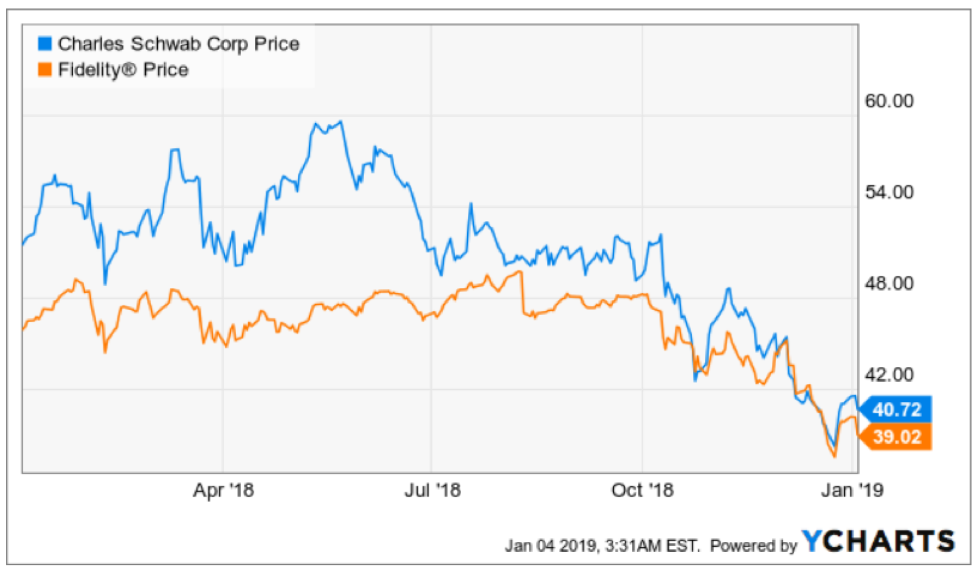Not Too Good To Be True
It seems time after time, entire industries get flipped on their heads without notice.
The modern-day hyper-acceleration of technology is creating tectonic shifts in the economy that only some can truly understand.
There is the good, the bad, and the ugly.
The functionality of technology has helped enhance our daily lives infinitely, yet there is a dark side of technology that has reared its ugly head threatening the future existence of mankind.
One industry next in line to be smashed to bits will have the effect of unimaginably reshaping Wall Street as we know it.
Gone are the days of brokers shouting from the trading pits, a bygone era where pimple-faced traders cut their teeth rubbing shoulders with the journeymen of yore.
The stock brokerage industry is at an inflection point with the revolutionary online stock brokerage Robinhood on the verge of shaking up an industry that has needed shaking up for years.
A common thread revisited by this newsletter is the phenomenon of broker apps being low-quality tech.
These apps can be built by a pimple-faced freshman college student in his dorm.
A broker ultimately serves little or no value to the real players among the deal, usually extracting huge commissions.
Technology and now blockchain technology vie to completely remove this exorbitant layer from the business process.
Well, for the stock brokerage industry, that time is now.
Robinhood is an online stock brokerage company based in Menlo Park, Calif., trading an assortment of asset classes including equities, options, and cryptocurrencies.
So, what's the catch?
Robinhood does not charge commission.
That's right, you can invest up until the $500,000 threshold protected by the Securities Investor Protection Corporation (SIPC) and you can go along with your merry day trading for free.
The online brokerage industry has been getting away with murder for years.
How did the online brokers get away with this in a technological climate where industries such as the transportation sector are being flipped on their head?
They got comfortable and stopped innovating - the death knell of any company.
Effectively, high execution costs reaping massive profits were the norm for brokers, and nobody questioned this philosophy until Robinhood exposed the ugly truth - unreasonably high rates.
Peeking at a monthly chart of brokerage costs will make your stomach churn.
For instance, a trader frequently executing trades with an account of $100,000 would hand over $1836 in commission in 2017 if their account was with Fidelity.
On the cheaper side, Interactive Brokers would charge $854 for its brokerage services to habitual traders per month.
The outlier was Tradier, a start-up brokerage founded in 2014 using the powerful tool of an API (Application Programming Interface) which charged $213 per month to trade frequently.
An API is described as a software intermediary allowing two applications to communicate with each other.
This model helped cut costs for the online brokerage because Tradier did not have to focus its funds on the trading platform that was delegated to various third-party platforms.
Tradier is largely responsible for the aggregation of data and charts thus employing an army of developers to meet their end of the business.
This model is truly the democratization of the online brokerage industry, which has been coming for years.
Costs are cut to a minimum with equity trades at Tradier costing investors $3.49 per order and options contracts costing $0.35 per contract with a $9 options assignment and exercise fee.
Technology has defeated the traditionalist again.
Day traders will tell you their largest worry is keeping a lid on execution costs.
Volume traders plan their strategies according to bare bones commission.
Marrying technology with online brokerages has the deflation effect that Amazon (AMZN) deftly took advantage of perfection.
Brokerages do not pay higher costs for an incremental bump in trading volume. Costs are mainly fixed.
If you hold a trading account in one of these legacy brokers charging an arm and a leg to trade with them, jump ship and join the revolution.
So how does Robinhood generate revenue if the broker trades for free?
Hawk ads? No.
They are not rogue ad sellers such as Facebook (FB).
The plethora of accounts opened with Robinhood earn interest, and Robinhood collects the earned interest as revenue.
Also, Robinhood has one paid service for sale.
Robinhood Gold is a subscription allowing traders to use margin. The margin accounts will set traders back $10 per month adding up to $120 per year, and they won't be charged interest on the funds.
This is peanuts compared to what other traditional brokerages are charging clients for margin account interest.
This is also a data grab with the proprietary data building up profusely turning into a potential Masayoshi Son SoftBank Vision fund acquisition.
Robinhood has almost registered a staggering 6 million accounts since 2013 – a staggering feat for an unknown and the momentum is palpable.
The meteoric rise of Robinhood coincided with the explosion of the price of bitcoin breaching the $20,000 level.
This price surge inspired a whole generation of millennials to get off the sofa and start trading cryptocurrencies.
More than 80% of Robinhood's accounts are owned by millennials – as expected.
Trading cryptocurrencies act as a gateway asset to springboard into other asset classes such as equities and derivative contracts.
Vlad Tenev, co-CEO of Robinhood, indicated that Robinhood will have to modify its radical business model to monetize more of the business in the future, but he is comfortable with the current business model.
But Tenev has already seen fruit borne with the likes of Robinhood applying fierce pressure to the legacy brokerages' pricing models.
The traditionalists are locked in a vicious pricing war with each other slashing their commission rates to stay competitive.
The longer the likes of Charles Schwab (SCHW) feel it necessary to charge $4.95, down from the January 2017 cost of $8.95, the better the chances are that Robinhood can build its account base rapidly.
Charles Schwab has more than 10 million accounts, only double the number of Robinhood, after being founded in 1971.
The 42-year head start over Robinhood has not produced the desired effect, and it is ill-prepared to battle these tech companies that enter the fray.
Robinhood has been able to add a million new accounts per year. If Charles Schwab relatively performed at the same rate, it would have 47 million accounts open today.
It doesn't and that is a problem because the company can be caught up to.
The lack of urgency to combat the tech threat is astounding. Companies such as Walmart (WMT) have taken the initiative to transform the narrative with great success.
The race to zero is a grim reality for the Fidelities (FFIDX) of the world, and adopting a Robinhood approach will be the playbook going forward.
Brokerages and a slew of other industries are turning into a legion of top-level developers fighting tooth and nail to stay relevant.
The transportation industry has grappled with this harsh reality lately, but the economy is on the cusp of many other industries digitizing to the extreme.
My guess is that Robinhood starts rolling out a slew of subscription services catering toward specific investors.
The age of specialization is upon us with full force, and customer demand requires care and diligence that never existed before.
Robinhood continues to enhance its offerings of various products adding Litecoin and Bitcoin Cash to the crypto lineup.
Only Bitcoin and Ethereum were offered before.
And there is one more outrageous thing I forget to tell you.
Robinhood is in the midst of going after traditional savings accounts by offering checking and savings accounts offering an interest rate almost 30 times larger than most brick and mortar banks – 3%.
These accounts would have no minimum balances or no fees that nickel and dime customers.
The service will conveniently sit alongside its trading app and this move into the industry led by JP Morgan could start to derail Wall Street.
As with most FinTech start-ups, the roll-out of this new service was slightly botched because Robinhood failed to get the go-ahead from regulators concerning ensuring the accounts properly.
All this does is delay the inevitable and by spring 2019, potential customers should be earning 3% in Robinhood’s checking and savings account.
Sign me up!
The company is not without headline investors boasting the likes of Andreessen Horowitz, the venture capitalist firm based in Menlo Park, Calif., Box (BOX) CEO Aaron Levie, and hip-hop mogul Snoop Dogg.
Expect Robinhood to pile the funds into improving the technology, data accuracy while offering more hybrid products.
The enhancements will attract another wave of adopters spawning another wave of panic from the legacy brokers.
All of this explains how Robinhood snapped up 6 million users and almost a $6 billion valuation in only 5 years – if the Batman of FinTech innovation is Square (SQ) then Robinhood is seriously the Robin of innovation at the same time.
To visit the pricing information at Robinhood, please click here.




